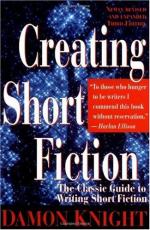
|
| Name: _________________________ | Period: ___________________ |
This test consists of 5 multiple choice questions and 5 short answer questions.
Multiple Choice Questions
1. What is alliteration?
(a) Repetition of vowel sounds.
(b) Repetition of juxtaposing terms.
(c) Repetition of consonant sounds.
(d) Repetition of similar meaning words.
2. What genre was once the preeminent genre?
(a) Romance.
(b) Western.
(c) Historical non-fiction.
(d) Literary fiction.
3. Which point of view does Knight believe to provide the most flexibility?
(a) First.
(b) Detached.
(c) Third.
(d) Second.
4. What does Knight describe as being irrelevant and confusing for both the reader and writer?
(a) Describing physical locations.
(b) Describing motivation.
(c) Describing directions.
(d) Describing dialogue.
5. What is the term used to describe the opposite of a satisfying resolution by Knight?
(a) Fade-out.
(b) Negative.
(c) Fade-in.
(d) Blank.
Short Answer Questions
1. To sell his story, of what must a writer be aware?
2. What is consonance?
3. If a writer has an idea but the phrasing is escaping him, what next course of action does Knight suggest should be next?
4. After writing a book, how long does Knight suggest that the writer should step away from it?
5. What does Knight describe as having emotional sensitivity?
|
This section contains 230 words (approx. 1 page at 300 words per page) |

|




